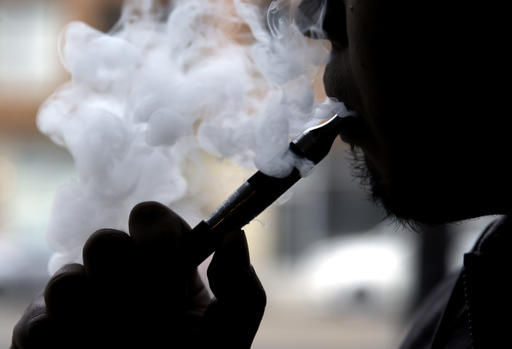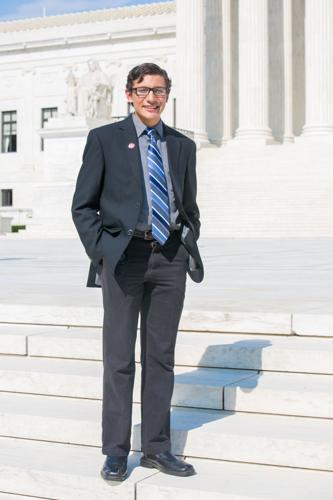Each day, high school students walk into Luis Garcia’s North Fourth Avenue smoke shop, backpacks and all.
They make the eight-minute walk from Tucson High Magnet School hoping to buy electronic cigarettes.
“That’s why I put up that sign,” said Garcia, pointing to a prominently displayed piece of paper that reads “18+ over.”
“It’s very popular and a lot of kids want to try it, but like cigarettes, you need to be 18,” said the owner of Smokey’s Smoke Shop, 519 N. Fourth Ave.
While teens are walking out of Smokey’s empty-handed, a recent survey shows they are getting their hands on e-cigarettes, with more than half of Arizona high-schoolers reporting that they’ve tried them.
E-cigarettes are devices that allow users to inhale a vapor containing nicotine or other substances.
In fact, Arizona high school students were more likely to have tried e-cigarettes than their peers across the country, the Centers for Disease Control and Prevention’s Youth Risk Behavior Survey found.
The survey also found there are more teens using e-cigarettes than there are teens smoking regular cigarettes.
It’s easy to see why, says John Schachter, spokesman for the Campaign for Tobacco-Free Kids.
“The industry has clearly been using a variety of methods that the old tobacco industry used to target its product to kids,” he said.
There are slick TV ads, celebrity sponsorships and more than 7,000 flavors, including cotton candy and gummy bear, that are blatantly appealing to kids, Schachter said.
“You have kids being bombarded with these products and the advertisements and the marketing for these products that they just don’t see nearly as much with cigarettes,” he said. “So whether it’s that they perceive them as healthy alternatives or some cool new product, it’s just something that’s being pushed out toward them and aiming for them to get addicted, and it’s obviously a problem.”
That kind of marketing is troubling to one Southern Arizona teen who is working to keep the addictive products out of the hands of his peers.
“The way I see it is that the tobacco companies always need replacements for people who quit or die, so they target youth,” said Alex Duarte, a junior at Douglas High School. “I just want to see kids live in a world where they’re not being targeted and sold a product that will have many different health effects.
“Many think it’s just water vapor when really there’s nicotine, and nicotine is known to be an addictive chemical — it’s a natural pesticide and if your body takes in enough of it, it can kill you.”
Studies have found that even e-cigarette products that claim to be nicotine-free sometimes contain traces of nicotine, Duarte added.
Duarte, a member of the Cochise County Youth Health Coalition, recently returned from a trip to Washington, D.C., where he was advocating for the need for action to protect kids from newer tobacco products like electronic cigarettes and flavored cigars, which also have become popular.
He was one of 21 youths from across the country participating in the Campaign for Tobacco-Free Kids’ Youth Advocacy Symposium, where he met with Arizona Rep. Martha McSally and the staffs of Sens. Jeff Flake and John McCain. Duarte first became interested in the issue as a sixth-grader, watching his older sister take part in his county’s youth health coalition for high school students.
While he was too young to become an official member, he snuck his way into conferences during middle school and joined when he entered the ninth grade.
Since becoming involved in anti-tobacco efforts, the 16-year-old has taken part in sting operations with the Attorney General’s Office, going to gas stations and convenience stores to see whether they will sell to those under 18, which is prohibited by law.
Having seen many places that do sell the products to kids, Duarte says he would like to see the creation of a tobacco license, similar to what is needed to sell liquor.
“That would make it so if they are caught selling to minors, you could take their license away and prohibit them from selling for a certain period of time,” Duarte said, adding that would have more of an impact than fines that are assessed now.
He has also seen how easy it is to buy e-cigarettes online, saying anyone can check a couple of boxes and claim they are 18, but there is no attempt to verify age upon delivery.
Researchers have found that e-cigarette devices are also being used by young people to smoke marijuana, all the more reason advocates are working to raise the tobacco sale age to 21 across the country, as has been done in Hawaii and California, Schachter said.
“When you raise the tobacco age from 18 to 21, you are really getting these products out of the high schools because as it stands now, younger students can get them from older high school students,” he said. “If you raise it to 21, you remove that access.”





